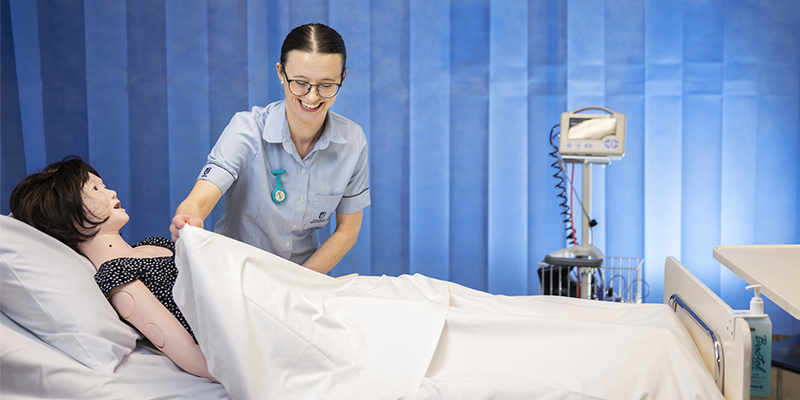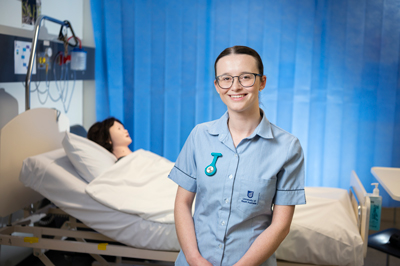Putting the focus on first-in-family experiences
By Rosanna Galvin
 EDUCATIONUniSA nursing graduate Madeline Lonsdale was the first in her family to go to university.
EDUCATIONUniSA nursing graduate Madeline Lonsdale was the first in her family to go to university.It was a coming-of-age trip to Europe and the United Kingdom when UniSA graduate Madeline Lonsdale had what she describes as an ‘epiphany’.
Sitting down with her relatives in London one evening, Lonsdale told her aunt that travelling had made her realise she wanted to do something meaningful in life; to help other people.
Her aunt’s response was simple but life-changing.
“She told me to just start. If I want to go to university then I should do it; the time would pass anyway,” Lonsdale says.
“In that moment, she helped me believe in myself. Since that conversation, it feels like so many doors have opened in my life – it’s been a natural progression from there.”
Returning to her hometown of Mount Gambier, Lonsdale enrolled in Foundation Studies at UniSA and went on to complete a Bachelor of Nursing, which she graduated from last year. Now working as a nurse at Flinders Medical Centre, it is career direction that wasn’t even on the radar for her growing up.
Lonsdale is the first in her family to go to university and while her parents were supportive when she told them she was applying, the idea of going to university was just not seen as an option.

“I clearly remember the phone conversation with my mum when I told her I was going to university – she said: you can’t, you didn’t finish high school,” she says.
“It wasn’t that she wasn’t supportive but when she was younger the idea of a bridging program such as Foundation Studies was unheard of at the time.”
Understanding the experiences of first-in-family students like Lonsdale is the focus of research being undertaken by UniSA Education Futures academic Dr Sarah McDonald.
Together with University of Queensland researcher Associate Professor Garth Stahl, Dr McDonald this month released a book titled Gendering the First-in-Family Experience: Transitions, Liminality, Performativity.
The book is based on findings from the First-in-Family Project, an Australian Research Council-funded study that followed 48 Australian ‘first in family’ students on their journey through university.
Dr McDonald says understanding the experiences of first-in-family students like Lonsdale is critical to increasing their participation in university.
“Despite efforts to widen participation, first-in-family students, as an equity group, remain severely underrepresented in higher education,” she says.
“We know very little about their experiences. Many first-in-family students may lack the necessary academic preparation and may struggle to navigate the muddy waters of post-secondary education.
“We found that many of the participants in our project experienced confusion over things like timetables, scheduling and commuting. How to navigate and conduct themselves in these spaces was a clear liability for many students.
“Some of this confusion came from misconceptions based on American television shows. This highlights how more can be done to familiarise non-traditional students with what university entails.”
Another key finding from the study was the mental health issues first-in-family students experienced during their time on campus – and the contrast in its presentation based on gender.
“Research in Australian higher education has found that students from lower socioeconomic backgrounds rated lack of money, time management, coursework assessment items, lack of sleep, and course marks as having a significant impact on their mental health,” Dr McDonald says.
“Within our study, 40.9 per cent of young women presented a mental health issue while only 3.8 per cent of young men did.
“While girls were more open from the onset, over the course of the project, young men began to either experience mental health issues or become more open about their mental health issues.”
Although the research revealed that first-in-family students had high attrition rates as a cohort, they also demonstrated an increased level of ‘grit’ and determination.
This was the case for Lonsdale, who thrived in the university environment and hopes to return one day to pursue a PhD. Part of her success comes down to the support she received in her first year undertaking Foundation Studies, an alternative university pathway program at UniSA College.
Lonsdale says she enjoyed her time at UniSA College, where she felt supported and part of a community – so much so that she decided to give back when she started her nursing degree by becoming a UniSA College ambassador.
“I wanted to be a friendly face on campus – to offer support to new students and just be there if someone needed to chat,” she says.
“Being part of the community on campus really helped me. I actually miss studying now that I’m working as a nurse – I love the academic environment and I hope to go into research one day.”
You can read more about first-in-family students and their transition to university in Dr McDonald and Prof Stahl’s new book.
Other Stories
- Citizen scientists needed to help tackle mosquito boom
- A healthier heart can protect your brain too. Five lifestyle changes to prevent dementia
- UniSA prepares for perfect landing with second simulator
- More than 30,000 students prepare to hit the books in 2022
- From the Vice Chancellor
- Achievements and Announcements
- First language footy program set to make a mark in APY Lands
- Spotlight on the unseen: MOD. launches new exhibition
- Pets in aged care homes makes paw-fect sense with new tool
- Putting the focus on first-in-family experiences
- Four prominent researchers named inaugural Bradley Distinguished Professors
- The latest books from UniSA researchers
- In Pictures: City West campus over summer




